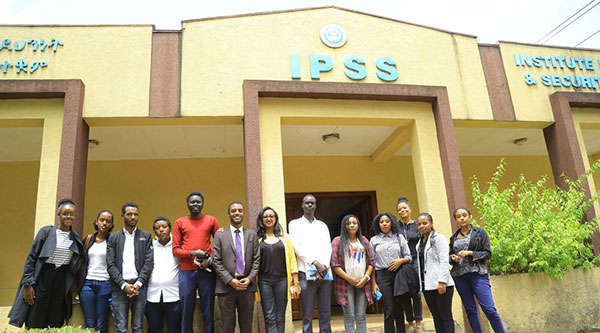On 19 April, the Tana Forum Secretariat organized a second youth consultation at IPSS on “Youth in Peace and Conflict: Does My Vote Count in Africa?”. The overall rationale of the youth consultation was to generate open and frank discussions pertaining to critical issues surrounding youth engagement in political processes and how this is tied to peace and security in Africa.
The participatory discussion was guided by the categorization of youth as political representatives; the role of civil society (organizations); and the role of (social) media and campaigning/election processes. Participants raised a number of challenges and recommendations on how best to harness the youth and what different stakeholders could take note when setting an agenda for inclusive youth processes in peace and security.
This youth consultation is part of a series of opportunities organized by the Tana Forum Secretariat as a way of capturing African youth voices and providing a platform for young Africans to engage with African heads of state and governments, practitioners and experts in peace and security in Africa.
The first youth consultation took place at the Pan-African youth network “African Youth Congress” (AYC) in Banjul, The Gambia under the theme “The Future Is Now; Youth are Not Too Young to Lead”. Click here to read more about the first youth consultation in The Gambia.
The overall discussion highlighted numerous challenges:
Youth as political representatives
- The political affiliation of national youth councils/federations (e.g. Ethiopia) where the majority of young people are still excluded;
- Lack of clear definitions of youth/representation of youth;
- Stereotypes that many youths are not interested in politics because they think it is for the older generation;
- Lack of/need for trust between youth and government;
- Too much talk and little action;
- Risk of youth involvement in conflict if they are not considered in politics (e.g. Libya);
- Ensuring the selection processes for youth representatives are truly open/free and allow for the representation of youth from all countries and at all levels.
- Lack of political will to engage with youth; and
- Lack of moral values/norms among youth.
Campaigning/electoral processes
- Ethnic affiliation of parties often not appealing to youth;
- Youth only mobilized during election times;
- Incentives for youth to participate in campaigns;
- Ethnic affiliations: youth also follow ethnic lines because they are afraid of losing access to economic power if “their group” loses;
- Promises during elections; and
- Political culture/mindset: youth often learn that politics is a dirty game and hence do not even want to engage.
Nonetheless, recommendations within the core subcategorization were shared and they include:
Youth as political representatives
- Intergenerational dialogue is needed;
- Create space for dialogue between youth and political actors (e.g. Sudan peace issues);
- Raise awareness among youth organizations engaging youth initiatives where they can participate;
- Raise awareness of politics / communicate politics in a results-oriented manner so youth can be inspired;
- Involve youth in policy making (if youth are not involved, they are not in the outcome);
- Mediators need to bridge the gap between youth and governments who can actually ensure that there are youth representatives;
- Selection processes for youth representatives (e.g. youth envoy at the AU) should actually be open/free/allow for the representation of youth of all countries/level;
- Youth need to focus on and/or agree on ideologies; and
- Youth have a role, not just as politicians, but within their social and cultural settings.
Campaigning/electoral processes
- Need to distance from following people and start following ideologies;
- Involvement in grassroots initiatives might be more effective than political parties; and
- Need for more checks and balances for elections (corruption in election systems, voting fraud, etc.).
Role of civil society
- Laws and reform;
- Civil education; and
- Freedom of expression.
Social media and CSOs
- Youth need to use social media more responsibly (can be abused for hate speech and endorsing violence); and
- Social media needs to be used more to celebrate and strengthen identities for youths.

